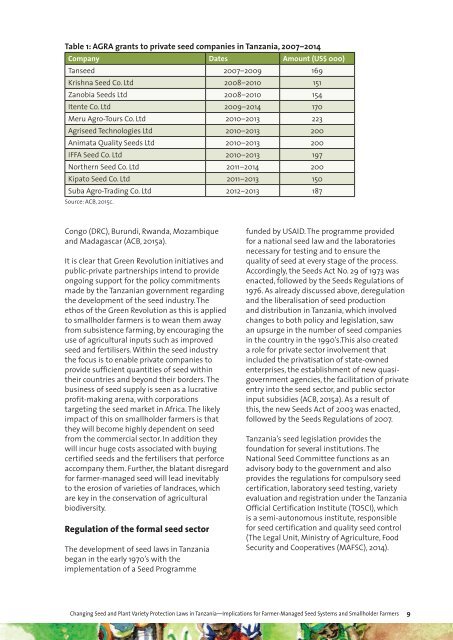Changing Seed and Plant Variety Protection Laws in Tanzania—
Tanzania-Seed-Law-2016
Tanzania-Seed-Law-2016
Create successful ePaper yourself
Turn your PDF publications into a flip-book with our unique Google optimized e-Paper software.
Table 1: AGRA grants to private seed companies <strong>in</strong> Tanzania, 2007–2014<br />
Company Dates Amount (US$ 000)<br />
Tanseed 2007–2009 169<br />
Krishna <strong>Seed</strong> Co. Ltd 2008–2010 151<br />
Zanobia <strong>Seed</strong>s Ltd 2008–2010 154<br />
Itente Co. Ltd 2009–2014 170<br />
Meru Agro-Tours Co. Ltd 2010–2013 223<br />
Agriseed Technologies Ltd 2010–2013 200<br />
Animata Quality <strong>Seed</strong>s Ltd 2010–2013 200<br />
IFFA <strong>Seed</strong> Co. Ltd 2010–2013 197<br />
Northern <strong>Seed</strong> Co. Ltd 2011–2014 200<br />
Kipato <strong>Seed</strong> Co. Ltd 2011–2013 150<br />
Suba Agro-Trad<strong>in</strong>g Co. Ltd 2012–2013 187<br />
Source: ACB, 2015c.<br />
Congo (DRC), Burundi, Rw<strong>and</strong>a, Mozambique<br />
<strong>and</strong> Madagascar (ACB, 2015a).<br />
It is clear that Green Revolution <strong>in</strong>itiatives <strong>and</strong><br />
public-private partnerships <strong>in</strong>tend to provide<br />
ongo<strong>in</strong>g support for the policy commitments<br />
made by the Tanzanian government regard<strong>in</strong>g<br />
the development of the seed <strong>in</strong>dustry. The<br />
ethos of the Green Revolution as this is applied<br />
to smallholder farmers is to wean them away<br />
from subsistence farm<strong>in</strong>g, by encourag<strong>in</strong>g the<br />
use of agricultural <strong>in</strong>puts such as improved<br />
seed <strong>and</strong> fertilisers. With<strong>in</strong> the seed <strong>in</strong>dustry<br />
the focus is to enable private companies to<br />
provide sufficient quantities of seed with<strong>in</strong><br />
their countries <strong>and</strong> beyond their borders. The<br />
bus<strong>in</strong>ess of seed supply is seen as a lucrative<br />
profit-mak<strong>in</strong>g arena, with corporations<br />
target<strong>in</strong>g the seed market <strong>in</strong> Africa. The likely<br />
impact of this on smallholder farmers is that<br />
they will become highly dependent on seed<br />
from the commercial sector. In addition they<br />
will <strong>in</strong>cur huge costs associated with buy<strong>in</strong>g<br />
certified seeds <strong>and</strong> the fertilisers that perforce<br />
accompany them. Further, the blatant disregard<br />
for farmer-managed seed will lead <strong>in</strong>evitably<br />
to the erosion of varieties of l<strong>and</strong>races, which<br />
are key <strong>in</strong> the conservation of agricultural<br />
biodiversity.<br />
Regulation of the formal seed sector<br />
The development of seed laws <strong>in</strong> Tanzania<br />
began <strong>in</strong> the early 1970’s with the<br />
implementation of a <strong>Seed</strong> Programme<br />
funded by USAID. The programme provided<br />
for a national seed law <strong>and</strong> the laboratories<br />
necessary for test<strong>in</strong>g <strong>and</strong> to ensure the<br />
quality of seed at every stage of the process.<br />
Accord<strong>in</strong>gly, the <strong>Seed</strong>s Act No. 29 of 1973 was<br />
enacted, followed by the <strong>Seed</strong>s Regulations of<br />
1976. As already discussed above, deregulation<br />
<strong>and</strong> the liberalisation of seed production<br />
<strong>and</strong> distribution <strong>in</strong> Tanzania, which <strong>in</strong>volved<br />
changes to both policy <strong>and</strong> legislation, saw<br />
an upsurge <strong>in</strong> the number of seed companies<br />
<strong>in</strong> the country <strong>in</strong> the 1990’s.This also created<br />
a role for private sector <strong>in</strong>volvement that<br />
<strong>in</strong>cluded the privatisation of state-owned<br />
enterprises, the establishment of new quasigovernment<br />
agencies, the facilitation of private<br />
entry <strong>in</strong>to the seed sector, <strong>and</strong> public sector<br />
<strong>in</strong>put subsidies (ACB, 2015a). As a result of<br />
this, the new <strong>Seed</strong>s Act of 2003 was enacted,<br />
followed by the <strong>Seed</strong>s Regulations of 2007.<br />
Tanzania’s seed legislation provides the<br />
foundation for several <strong>in</strong>stitutions. The<br />
National <strong>Seed</strong> Committee functions as an<br />
advisory body to the government <strong>and</strong> also<br />
provides the regulations for compulsory seed<br />
certification, laboratory seed test<strong>in</strong>g, variety<br />
evaluation <strong>and</strong> registration under the Tanzania<br />
Official Certification Institute (TOSCI), which<br />
is a semi-autonomous <strong>in</strong>stitute, responsible<br />
for seed certification <strong>and</strong> quality seed control<br />
(The Legal Unit, M<strong>in</strong>istry of Agriculture, Food<br />
Security <strong>and</strong> Cooperatives (MAFSC), 2014).<br />
<strong>Chang<strong>in</strong>g</strong> <strong>Seed</strong> <strong>and</strong> <strong>Plant</strong> <strong>Variety</strong> <strong>Protection</strong> <strong>Laws</strong> <strong>in</strong> <strong>Tanzania—</strong>Implications for Farmer-Managed <strong>Seed</strong> Systems <strong>and</strong> Smallholder Farmers 9


